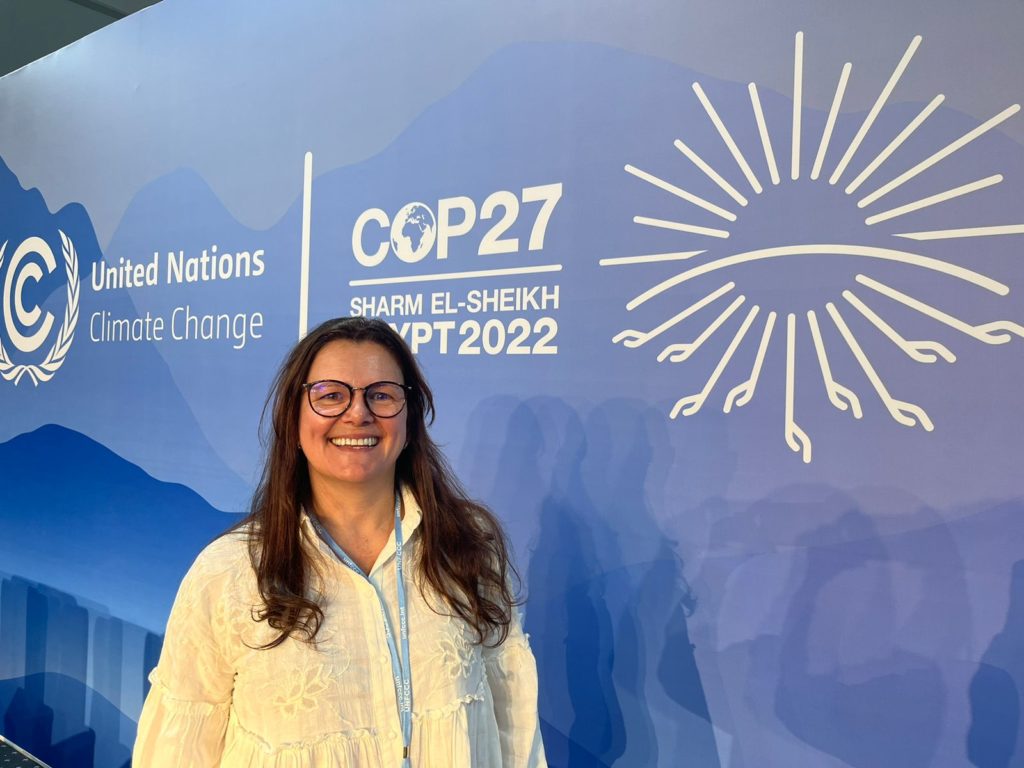Sharm El Sheikh – A Brazilian fashion company produces jeans using just a cup of water instead of the 100 liters usually needed. This is Malwee Lab Jeans, one of Malwee’s sustainability projects, which makes jeans using nanotechnology. Malwee’s Sustainability manager, Taise Beduschi (pictured above), spoke with ANBA at the United Nations Conference on Climate Change (UNFCC COP27) in Sharm El Sheikh, Egypt.
The company had already attended UN Climate Conferences for a few years, and, this time, it was invited to present a panel at the Brazil pavilion by the Brazilian Support Service for Micro and Small Business (SEBRAE) and tell about its expertise in sustainability.
The fashion industry is among those causing the most significant impacts on the environment. Taise joined the company in 2013 and stated it had been concerned about the environment for many years. “I came from agribusiness, so when I joined Malwee, I went looking for an assessment of the life cycle of products to find where the largest share of emissions was. We discovered that the GHG Protocol Scope 3 represents 94% of our emissions, which is the raw inputs chain. Cotton and polyester emit a lot of carbon because many chemicals and fertilizers are used in the crop. The higher impact is in scope 3,” said Taise.
However, she stated Brazilian cotton does not consume much water because it is grown in dry conditions and not irrigated as in other countries. “The impact of our industry in Brazil is greater on gases than on the water,” she said.
Sustainable jeans
Taise says Malwee has always worked with the quality and durability of its products in mind. Two years ago, a laundry facility was installed at the company’s plant to produce the jeans using only a cup of water. “There are only five such laundries in the world, and after many tests, we managed to produce a pair of jeans using 200 ml of water instead of 100 liters, all with nanotechnology. It’s Malwee Lab Jeans. We are the only ones in Latin America to have this technology, and we use it to total capacity,” she said.
Malwee, according to Taise, is not a fast fashion company. “We think about the durability of clothes connected with the circular economy. We have a culture of quality hand in hand with durability, and customers recognize this. We always work with customization and clothing care tips for them to last longer,” she said.
2030 Goals
Taise set up Malwee’s sustainability program for 2020 and last year announced the goals for 2030. There are six primary goals aligned with the UN Sustainable Development Goals (SDGs): Reduction of water consumption, reduction of atmospheric emissions (greenhouse gases), and recycling of resources; in the social area, decent work, gender, and race equality.
“As for material resources, raw inputs generate big impacts, such as cotton and polyester, so if we have recycled raw materials, we could improve water and energy consumption, which has brought good results,” said Taise. According to her, plant emissions have already been reduced by 75% from 2015 to 2020 with the change of power matrix, and water is reused inside the factory. Now, the company aims to reduce another 50% by 2030.
Other initiatives
Malwee has a strong history of supporting the community and has planted 85,000 trees in a 1.5 million square meter park. “We have a whole concept of community and investment in reducing and mitigating environmental impact. For a long time, for instance, we have been reusing water for the plant, treating and reusing it in the factory itself, which is more challenging. This has been happening since 2003,” she said.
The first sustainable raw material was recycled polyester from PET bottles in 2008. Defibered cotton, made with cut textile residue, began to be used in 2011.
Malwee is a privately held company serving the entire Brazilian national market. It has three plants, two in Jaraguá, in the state of Santa Catarina, and one in Pacajus, in the state of Ceará. In total, it has 4,200 employees. In 2021, 49 million items were produced across the company’s six brands.
Translated by Elúsio Brasileiro




